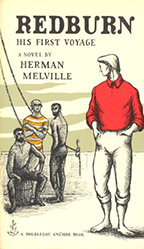A sailor’s life told with humor and poignancy
Redburn, the fourth novel by Herman Melville, was published in 1849, two years before his masterpiece Moby-Dick. Like Moby-Dick and the handful of novels that came before, Redburn is a nautical narrative. Similar to Melville’s earlier books Typee and Omoo, Redburn bears an eyewitness immediacy that indicates this is likely a semi-autobiographical work of Melville’s own seafaring adventures, though no doubt portions of the work are fictionalized. The adventure in question is not as exciting as that of Typee, but Melville’s skills as a prose stylist have improved quite a bit since his literary debut. Redburn, which reads a bit like Moby-Dick but without all the deep philosophizing, is also a work in which Melville frequently exhibits his sense of humor.
Wellingborough Redburn, the son of a formerly wealthy gentleman, lives in a village on the Hudson River in New York State. After his father undergoes a fall from grace in business and finances, Redburn is forced to work for a living. Unable to find gainful employment in his hometown, he decides to follow his natural wanderlust into a career as a sailor. In embarking on this new life, he must start at the bottom, and he signs on as a “boy” on the ship Highlander bound for Liverpool. Blue-collar workers derogatorily might refer to Redburn as a “college boy” for the airs of intellect and refinement that he puts on. In the world of nautical employment, however, he is a greenhorn and a bumbler. One can sense that Melville is making fun of his younger self when he points out what a ridiculous fish-out-of-water Redburn is in this harsh new environment. As Redburn learns the ins and outs of the sailing life, the reader learns along with him and shares in his embarrassments. While Redburn is forced to live through these indignities, however, the reader has the luxury of laughing from the sidelines.
Although this novel isn’t loaded with symbolism and mysticism to the extent of Moby-Dick, it still ends up being surprisingly profound for a book that starts out as a rather lighthearted fictionalized memoir. More so than the earlier novels in his career, Redburn shows Melville rising to the level of literary greatness one would expect from the author of Moby-Dick.
Wellingborough Redburn, the son of a formerly wealthy gentleman, lives in a village on the Hudson River in New York State. After his father undergoes a fall from grace in business and finances, Redburn is forced to work for a living. Unable to find gainful employment in his hometown, he decides to follow his natural wanderlust into a career as a sailor. In embarking on this new life, he must start at the bottom, and he signs on as a “boy” on the ship Highlander bound for Liverpool. Blue-collar workers derogatorily might refer to Redburn as a “college boy” for the airs of intellect and refinement that he puts on. In the world of nautical employment, however, he is a greenhorn and a bumbler. One can sense that Melville is making fun of his younger self when he points out what a ridiculous fish-out-of-water Redburn is in this harsh new environment. As Redburn learns the ins and outs of the sailing life, the reader learns along with him and shares in his embarrassments. While Redburn is forced to live through these indignities, however, the reader has the luxury of laughing from the sidelines.
In Redburn, Melville presents a very interestingly unglamorized view of shipboard life. Once the boat reaches Liverpool, however, the narrative loses some steam. Melville digresses into some extended travel literature critical of the city of Liverpool, of which there’s a bit too much, but he eventually returns to the seafaring narrative. The laughs are not so forthcoming in the book’s latter half, however. Instead, Melville delivers poignancy and pathos through some memorable incidents in the lives of Redburn’s crewmates.
Masculinity is a theme that’s examined throughout the book. Most of the sailors on board the Highlander are of the aggressively macho variety, the extreme embodiment of which is Jackson, who almost resembles the alpha male of a gorilla troop. The more seasoned members of the crew are always ready to point out what they perceive as a lack of manliness on the part of Redburn. The title character gets off easily, however, compared to his friend Harry Bolton, who is described as such a soft and sensitive dandy that he comes across as somewhat of an androgyne. It seems as if a few characters in the book are intended to be gay (including Bolton, but not Redburn), though Melville couldn’t explicitly state that in a work of 1840s America literature. Nevertheless, he does acknowledge homoeroticism as a fact of life aboard ship. Melville makes it none too subtly clear that after long months at sea the macho sailors, tired of looking at each other’s ugly mugs, would vie for the attentions of a comely, effeminate male passenger or crewmate, even if the attentions paid were nonsexual.
Although this novel isn’t loaded with symbolism and mysticism to the extent of Moby-Dick, it still ends up being surprisingly profound for a book that starts out as a rather lighthearted fictionalized memoir. More so than the earlier novels in his career, Redburn shows Melville rising to the level of literary greatness one would expect from the author of Moby-Dick.
If you liked this review, please follow the link below to Amazon.com and give me a “helpful” vote. Thank you.



No comments:
Post a Comment